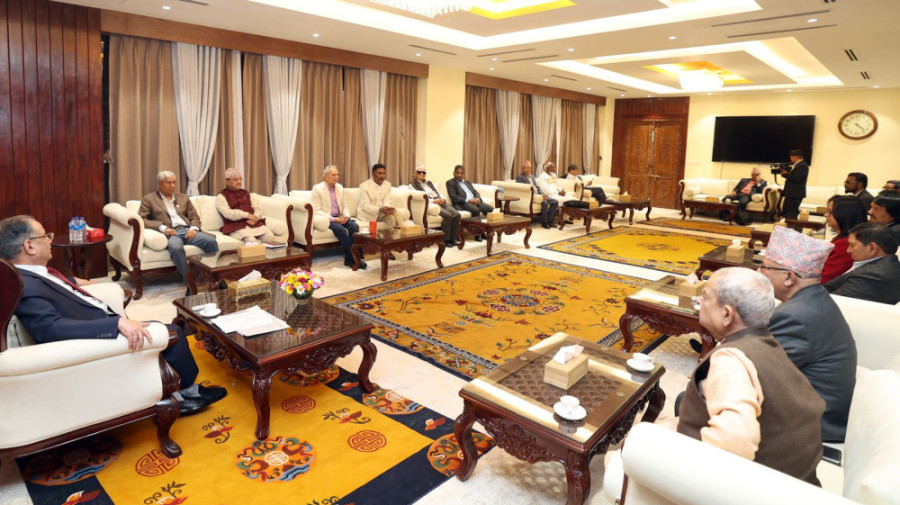Politics
Deal on power-sharing eludes ruling parties
Prime minister presented the Common Minimum Programme at Tuesday’s meeting, to be endorsed with necessary changes.
Post Report
The ruling coalition failed to agree on power-sharing on Tuesday as its major partners stuck to their guns, tying the hands of Prime Minister Pushpa Kamal Dahal who has often said the Cabinet would be expanded without further delay.
Dahal was preparing to appoint new ministers on Wednesday after finalising the division of ministries among the parties supporting him on Tuesday.
“With major parties demanding ministries more than the prime minister can allot, discussions on power-sharing did not move ahead today,” said a senior leader of a major party in the coalition. “Once the four major parties agree on the numbers, we will enter ministerial portfolios on Wednesday.”
With the coalition failing to divide the ministries, the meeting was adjourned until Wednesday morning.
The coalition meeting will finalise the Common Minimum Programme prepared by the team of Rajendra Shrestha of Janata Samajbadi Party, Ramesh Lekhak of the Nepali Congress, Shakti Basnet of the Maoist Centre and Vijay Poudel of CPN (Unified Socialist).
“Today the coalition partners tentatively agreed on the government’s Common Minimum Programme (CMP) which was presented by the prime minister at the meeting while discussing power-sharing,” said Manahari Timilsina, a media expert to the prime minister. “The next meeting scheduled for tomorrow morning will finalise the CMP and the power-sharing deal.”
According to leaders present at the meeting, the coalition partners presented their claims to the ministries. The prime minister presented the draft CMP, which another meeting will finalise with necessary changes while also agreeing on a power-sharing deal, according to them.
According to leaders involved in the negotiations, the largest party—Congress—has demanded nine ministries, Janata Samajbadi Party and CPN (Unified Socialist) want three ministries each while Loktantrik Samajbadi Party claimed two ministries during Tuesday’s meeting.
Maoist leaders said the meeting failed to arrive at a conclusion because the parties have demanded more and plum ministries while there are a limited number of ministers the prime minister can appoint within the constitutional limit.
Earlier in the morning, CPN (Unified Socialist) leaders including its chair Madhav Nepal had met the prime minister to demand at least three ministries in the federal government and at least four ministers in provincial governments, two provincial chiefs and a chief minister. Leaders of the party argue that they need more ministries because the party has not got any constitutional positions such as President, Vice President and Speaker.
However, the prime minister, according to the leaders, had told them that it would be difficult for him to allocate the ministers as demanded. He has promised them to be as generous as possible, they said.




 14.12°C Kathmandu
14.12°C Kathmandu













